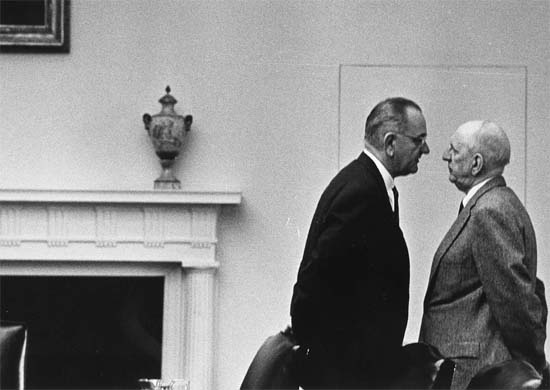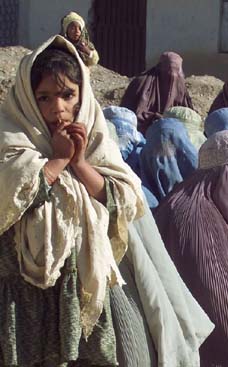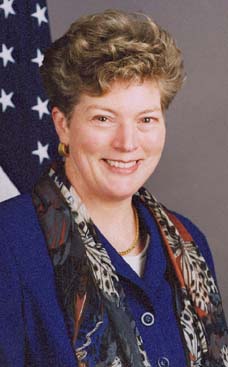
For decades Johnson has been a pariah in the Democratic Party, because of the disaster into which he led the country in Vietnam. And
today, because of our complex racial politics, even his successes, which partly redeem the sins of his war, can’t be attributed to Johnson. When Hillary Clinton, during the New Hampshire primary, made the historically unimpeachable point that there would have been no Civil Rights Act without a President Johnson to push the bill through, she was accused by everyone from the New York Times to the Obama campaign of somehow denigrating King. These charges were false, but they showed that there is something unmentionable about Johnson’s courage and his accomplishment. Journalist George Packer served as a Peace Corps Volunteer in Togo.
George Packer writes: After he became President, Johnson risked everything, including his own office and the Democratic Party’s electoral future, to pass the landmark bills for civil rights in 1964 and voting rights in 1965
L.B.J.’s Moment
This coming Wednesday, August 27, is the one-hundredth anniversary of the birth of Lyndon Baines Johnson. The following day, August 28, is the forty-fifth anniversary of Martin Luther King, Jr.,’s speech on the steps of the Lincoln Memorial, at the climax of the March on Washington. That evening, Barack Obama will accept the nomination of the Democratic Party as its candidate for President. These three events are linked in perhaps the most momentous story in recent American history—yet hardly anyone dares to point it out, and Johnson’s name will almost certainly go unmentioned when the Democrats gather this week in Denver.
Johnson was a ruthless politician who was willing to destroy other people and steal an election to get what he wanted. Throughout his congressional career he was more interested in power than ideals. Although he pushed through a watered-down civil-rights bill as Senate Majority Leader in 1957, the civil- rights movement did not consider Johnson—a Southerner, and the protégé of Senator Richard Russell of Georgia, an unreconstructed racist—its friend. But after he became President, Johnson risked everything, including his own office and the Democratic Party’s electoral future, to pass the landmark bills for civil rights in 1964 and voting rights in 1965. He achieved greater things in domestic legislation than any President other than F.D.R. He achieved far more than the man he succeeded, John F. Kennedy. Johnson’s Presidency represented the zenith of American liberalism, and its downfall.
For decades Johnson has been a pariah in the Democratic Party, because
of the disaster into which he led the country in Vietnam. And
today, because of our complex racial politics, even his successes, which partly redeem the sins of his war, can’t be attributed to Johnson. When Hillary Clinton, during the New Hampshire primary, made the historically unimpeachable point that there would have been no Civil Rights Act without a President Johnson to push the bill through, she was accused by everyone from the New York Times to the Obama campaign of somehow denigrating King. These charges were false, but they showed that there is something unmentionable about Johnson’s courage and his accomplishment.
But King himself knew what Johnson had done, and he gave the President enormous credit when they met after the legislation was signed. James Farmer, the great leader of the Congress of Racial Equality, told the story of a conversation he once had with Johnson in the White House:
I asked him how he got to be the way he was. He said, “What do you mean?” I said, “Well, here you are, calling senators, twisting their arms, threatening them, cajoling them, trying to line up votes for the Civil Rights Bill when your own record on civil rights was not a good one before you became Vice President. So what accounted for the change?” Johnson thought for a moment and wrinkled his brow and then said, “Well, I’ll answer that by quoting a good friend of yours and you will recognize the quote instantly. ‘Free at last, free at last. Thank God Almighty, I’m free at last.’”
Four decades later, Barack Obama is a beneficiary of those transformative events of the early Johnson Presidency. His nomination would not be possible without the Voting Rights Act. Michael Janeway, the author of The Fall of the House of Roosevelt, told me that when Johnson’s former aide Harry McPherson, now almost eighty, went to vote in the Maryland Democratic primary in February, a precinct official recognized him and said, “Lyndon Johnson would be a happy man today.”
Whenever Democrats gather to celebrate the party, they invoke the names of their luminaries past. The list used to begin with Jefferson and Jackson. More recently, it’s been shortened to F.D.R., Truman, and J.F.K. The one Democrat with a legitimate claim to greatness who can’t be named is Lyndon Johnson. The other day I asked Robert Caro, Johnson’s Pulitzer-Prize-winning biographer and hardly a hagiographer of the man, whether he thought Johnson should be mentioned in Denver. “It would be only just to Johnson,” Caro said. “If the Democratic Party was going to honestly acknowledge how it came to the point in its history that it was about to nominate a black American for President, no speech would not mention Lyndon Johnson.” Caro is now at work on the fourth volume of his epic biography, about Johnson’s White House years. “I am writing right now about how he won for black Americans the right to vote. I am turning from what happened forty-three years ago to what I am reading in my daily newspaper—and the thrill that goes up and down my spine when I realize the historical significance of this moment is only equaled by my anger that they are not giving Johnson credit for it.”
In the week of Johnson’s one hundredth birthday, I would like to believe that there is some Democrat in Denver who will do him the justice of speaking his name.













